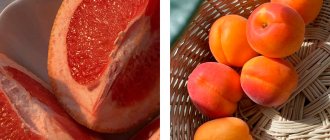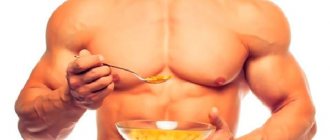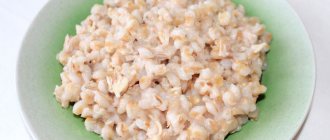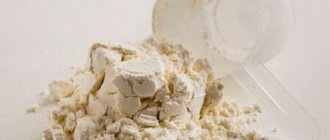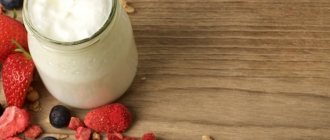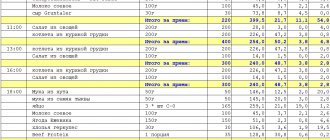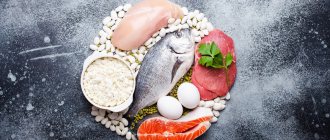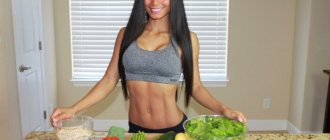We wrote in our previous article that the diet of older people should be balanced and varied. But what should the caloric content of the diet be? What should be the diet? How are medications combined with food? Why should you pay attention to what foods are on your plate?
The expert of the information portal “Healthy People” was the chief freelance gerontologist of the Ministry of Health, head of the Republican Gerontological Center (Active Longevity) Lyudmila Zhilevich. Let's continue the conversation.
Energy value
Excess calories in almost all cases leads to weight gain or obesity. This is an axiom. In old age, excessive consumption of excessively high-calorie foods, in addition to excess weight, can trigger pathological processes that will lead to the development of diabetes mellitus, atherosclerosis, arterial hypertension, gout, urolithiasis, cholelithiasis.
By the way, according to a study by American scientists, the amount of calories consumed with food can affect life expectancy and even accelerate aging.
On average, the daily norm of energy value in old age is:
- for men – 2,300 kcal;
- for women – 2,100 kcal.
With age, the norms change somewhat. Thus, the World Health Organization recommends gradually reducing the amount of calories in the period from 30 to 70 years by a total of about 30%.
The lifestyle of an elderly person is also important. If he is still active or working, his energy needs are greater than those of his more passive peer. As the interlocutor said, controlling daily caloric intake is quite simple: if the weight is stable, then everything is normal. In any case, you need to adhere to the following rule: the number of calories per meal should not exceed energy costs.
Popular Misconceptions
To lose weight you need to reduce your caloric intake. But this statement only works within reasonable limits. Complete refusal to eat can only worsen the condition and increase swelling of the body. The body is not so easy to deceive.
Minimizing calories puts the body into strict economy mode. At the same time, its waste will be insignificant - weight loss will stop, since all products will be intensively converted into fats.
As a result, a daily menu that is compiled incorrectly only increases weight. And calorie content has no effect on this. A hunger strike literally dries out the body, ridding it of essential water and muscle elements.
Diet
In old age, noted Lyudmila Zhilevich, nutrition should be regular, without long “hungry” intervals. It is advisable to divide meals into 4–5 times.
With four meals a day, the number of calories per day is distributed as follows:
- 25% – first breakfast;
- 15% – second breakfast or afternoon snack;
- 35% – lunch;
- 25% – dinner.
With five meals a day, experts recommend dividing the energy requirement as follows:
- 25% – 1 breakfast;
- 15% – 2 breakfast;
- 30% – lunch;
- 20% – 1 dinner;
- 10% – 2 dinner.
For breakfast, you can cook porridge and drink herbal tea. Second breakfast includes a light salad or baked fruit or vegetable. Lunch is more substantial. It can consist of soup, main course, compote (fruit drink). Dinner should be light so as not to overload the digestive system at night, but nutritious. Before going to bed, it would be a good idea to drink fermented baked milk or kefir.
Lyudmila Zhilevich chief freelance gerontologist of the Ministry of Health, head of the Republican Gerontological Center (active longevity):
– It is advisable to choose natural products, with a lesser degree of culinary processing and without various artificial additives. Use greens and herbs. And one more thing: you should not get carried away with exotic foods; it is preferable to eat those vegetables and fruits that are familiar to our body.
If after the age of 75 a person loses his appetite and begins to lose weight quickly, this may be a sign of senile asthenia or pathological aging! By adjusting your diet, this process can be stopped. The main rule: the diet should contain enough protein and vegetable fats.
With age, dental problems can make themselves felt. As a result, older people prefer grated food with a more liquid consistency. This makes chewing easier, but does not put enough stress on the intestines. In this case, Lyudmila Zhilevich advised consuming more greens or dietary fiber as an additional supplement.
Examples of dishes
For a dietary breakfast on the menu day, it is better to choose something grain or fermented milk. This allows you to get a boost of energy, as well as useful and necessary probiotics. For example, you can cook:
Cottage cheese salad with buckwheat
Soak the buckwheat overnight in cool water. In the morning, add low-fat cottage cheese and any vegetables to it. Season with lemon juice and olive oil to taste. You can stir and sprinkle parsley, cilantro and dill on top. If desired, add a little salt.
Dinner
Soup is the main dish of this meal, the basis of a healthy diet. A great solution is meatball soup.
Preparation:
For meatballs, mix minced meat, eggs, bread. Cut potatoes and turnips into strips, cook vegetables for 15 minutes, add meatballs to the soup. Cook for another 10 minutes and leave for about 15-20 minutes. When serving, sprinkle with finely chopped herbs.
Dinner may not have any fresh ideas. It is quite possible to finish the food from lunch. For taste, add lettuce leaves with vegetable oil, tomatoes and vinegar.
Combination of food and drugs
When taking medications, it is very important to consider their compatibility with food. For example, those who take Warfarin need to be careful when eating cabbage, spinach, green tea, and cucumbers. These products can affect the level of INR (one of the indicators of the blood coagulation system). Or the patient is taking a non-steroidal anti-inflammatory drug. This already puts a lot of stress on the gastric mucosa, and if you add fried and fatty foods, you can get a whole bunch of undesirable consequences. The erythromycin group of drugs is not always combined with dairy products.
Lyudmila Zhilevich chief freelance gerontologist of the Ministry of Health, head of the Republican Gerontological Center (active longevity):
– There are many such examples. Therefore, I advise you to check with your doctor which foods should not be consumed with your medications. Anticoagulant drugs are especially sensitive to foods (they reduce the activity of the blood coagulation system and prevent excessive blood clot formation).
The interlocutor also reminded that you should take the tablets only with water. Do not neglect the time of taking the medicine. If the instructions say that you should take the medicine “before or after meals,” that’s what you should do. There are drugs that reduce their effectiveness after eating by 50%.
General information
A 1500 calorie diet is the most suitable option for normalizing nutrition. This diet is perfect for a short girl who wants to reduce her body fat percentage. In this case, the diet does not affect muscle elements, muscle mass is preserved.
Content:
- General information
- What is the secret to losing weight?
- Diet per day: sample menu for one day
- Sample menu for the second day
- General recommendations
- Popular Misconceptions
- Efficiency of weight loss
- Examples of dishes
- Unencumbered days
Recommended by gerontologist
Having summarized all of the above, we have formulated several general recommendations. Following them will help you always stay in shape and maintain good health:
- It is better to boil fish and meat, stew, bake or steam.
- You can consume no more than 30 g of sugar per day (in 1 teaspoon - approximately 5 g of sugar without a slide). Don't forget about hidden sugar (sauces, canned foods, baked goods).
- Don't overuse salt. No more than 3 g per day is recommended.
- It is advisable to cook soups with meat broth no more than two or three times a week. There is an opinion that frequent consumption of such dishes contributes to the development of gout. It is better to cook vegetable soups.
- Every day one of the dishes should be porridge or any other dish made from cereals.
- If there are no contraindications, such as swelling, you should drink 1.5–2 liters of water per day. All liquids are counted, including soups, tea, juices, water, etc.
- Eat seafood whenever possible. They are rich in polyunsaturated Omega-3 fatty acids, which are beneficial for the cardiovascular system.
- The last meal should be at least 3 hours before bedtime. Late eating contributes to the body producing “bad” cholesterol - the cause of atherosclerosis.
Article: Nutrition in old age. Calorie content and daily diet.
Sample menu for a week for 1800 calories per day
It is better to prepare the menu in advance. If you know what you'll be eating on a given day, the temptation to eat a hamburger or candy bar will be less.
Monday
Example menu for Monday:
- morning: 2 tbsp. oatmeal with milk, 20 g prunes, 2 slices of bran bread with low-fat cheese;
- lunch: 1 banana, ½ tbsp. yogurt;
- afternoon: 200 ml chicken broth with noodles, 150 g rice, 150 g chicken breast;
- snack: 40 g walnuts or peanuts;
- evening: 150 g baked hake fillet, 200 g tomato salad, 150 g boiled potatoes.
Tuesday
A daily meal plan might look like this:
- breakfast: 200 g buckwheat porridge with 1 tsp. butter, rye bread, 20 g cheese;
- snack: 2 peaches, ½ tbsp. kefir;
- in the afternoon: 300 ml of lean borscht, 100 g of pork liver stewed with onions, 200 g of baked potatoes;
- snack: 30 g almonds, 200 g cottage cheese;
- dinner: 150 g chicken breast, 150 g seaweed salad.
Wednesday
Menu for Wednesday:
- in the morning: a sandwich of rye bread with cheese, 2 boiled eggs;
- lunch: 200 g of cucumber, onion and tomato salad;
- daily meal: 300 ml cabbage soup with potatoes, 100 g boiled beef, 100 g buckwheat porridge;
- afternoon snack: 30 g raw sunflower seeds, 1 tbsp. kefir;
- dinner: 80 g of boiled peas, 150 g of pollock baked in foil.
Pros and cons of the 1200 calorie low calorie diet
Pros of the diet:
- Even if you lead a sedentary lifestyle, the diet will allow you to achieve the desired results.
- The diet menu is balanced.
- Harmful products are prohibited.
- The diet can be rearranged at your own discretion.
- The effect comes quickly.
Disadvantages of the diet:
- It is necessary to count kilocalories.
- At the very beginning of the diet, you may experience a feeling of weakness and drowsiness, as the daily caloric intake is sharply reduced.
- If a person engages in strenuous sports or experiences significant physical exertion, this diet is not suitable for him.
Reviews
Check out reviews of the 1300 kcal diet:
Writes Anna, 24 years old: Well, I’ll write my review. I think that 1300 kcal is very little, but I liked the diet from Kostochka - it is very easy to tolerate and without hunger, since it contains a lot of protein and enough fatty acids, as well as a lot of salads and broth - all this is very satiating. I give myself 3 days a week with this caloric content, on the rest I eat everything, not counting calories - you know, in 2 weeks - minus a kilo!!! Considering that I’m not losing weight, but just want not to get fat, the result is a fire.
Writes Ivan, age unknown: The recipes are all delicious, but this menu is more suitable for women - a man can’t get enough of grass alone. I added 2 servings of prota and 150 grams of buckwheat to the diet (this is in dry form, when boiled it’s just a bowl), plus another 400 grams. chicken - happy as an elephant!!!
Writes aizima, 34 years old: This is a really surprisingly satisfying meal plan - it looks like it’s just grass and protein, but due to either oil or such a cool variety, there is absolutely no hunger. I sat on such a diet for a week, until I even got tired of it... In 7 days, minus 5 kilos (I weigh 70 kg with a height of 165, yes, I know, a cow). THANK YOU BONE WIDE!!!!!
BJU ratio
You can also lose weight on bread and water, but if you want the process to be slow, gradual, without harm to your health, it is important to monitor the balance of BJU. The formula is simple: 30-35% proteins, 15% fats, 50-55% carbohydrates. The General Food menu has 1,800 calories evenly distributed throughout the day. This is not a diet, but a new way of life, without hassle in the kitchen and searching for healthy products. Please note that you cannot skip meals or change their places; to achieve results, you must follow the distribution of food intake throughout the day.
Contraindications
Contraindications to the diet:
- Diseases of the urinary and hepatobiliary system.
- Diabetes.
- Inflammation of the gallbladder.
- Infectious diseases.
- Age under 16 years.
- Pathologies of the heart and blood vessels.
- Alcohol abuse.
- Bronchial asthma.
- Pregnancy and breastfeeding.
- Oncology.
- Drug addiction.
- Having had a heart attack or stroke.
- Age over 65 years.
